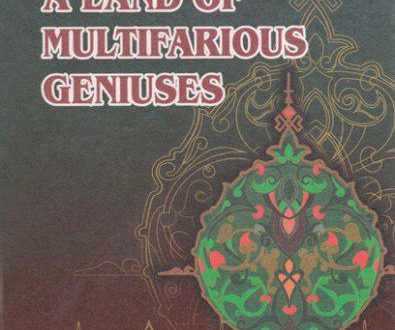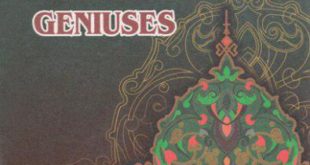After living in Mecca for three years, the scholar wanted to go back to his motherland and left Mecca. On the way home, he made a short stay in Baghdad. At that time, Baghdad was one of the civilized centres of science and education. There he had meetings with the leading experts of the Islamic sciences of that time and took an active part in the debates held at the scientific and educational centres of this city discussing the most urgent and debatable problems of the contemporary science and education. Then the scholar came back to Khoresm and, having lived there for some time, died in 538/1144 on the eve of the holiday of Ramadan in Jurjania (modern Kuhna Urgench). After two hundred years of his death, a famous Arabian traveller Ibn Buttuta (1304-1377), who visited Khoresm in 1333, wrote in his work “Ar-Rihla” (A Travel Book) that he had seen the mausoleum of Mahmud az-Zamakhshari with a high dome in the outskirts of Khoresm (Kuhna Urgench).
A great scholar Mahmud az-Zamakhshari left rich and huge scientific and spiritual legacy. He created around sixty creative works dealing with linguistics, lexicography, literature, styles of verses, morality, logic, geography, tafsir, hadith, law, rules of reading and pronunciation most of which have reached us. In order to have a clear imagination about his wide-scaled potential and status in the field of science and education, we would like to present the ideas and opinions of his contemporaries as well as the scholars who lived in the later periods.
A famous Arabian historian Ibn al-Qifti wrote about az-Zamakhshari the following lines: “Az-Zamakhshari (God save his soul) was a great scholar in the fields of morality, morphology, syntax and lexicography. He could be an example for other specialists in these fields. He met a number of specialists in different fields of science and knowledge and left precious works dealing with tafsir, hadith, grammar and other branches of science. He was the greatest figure among the ajams1 who created his works in the Arabic language”.
A famous Arabian scholar Ibn Khallikan wrote about him: “Mahmud az-Zamakhshari was a great scholar in the fields of tafsir, hadith, grammar, lexicology and style of composition. We may say without any exaggeration that he was the only expert in these sciences and the author of lots of scientific works on them”.
A famous Egyptian historian Ibn Taghriberdi, who lived some centuries later than az-Zamakhshari, wrote about him the following lines: “He was a sheikh, a great scholar, the most respected scientist and the leader of the scientists of his time as well as the greatest imam”.
Among his creative works, the books on linguistics, especially on grammar and its branches play an important role for the most solid part of his scientific and educational legacy. His book on the grammar of the Arabian language “Al-Mufassal fi-n-nahv” was written for a year and a half during his stay in Holy Mecca. In studying the grammar and syntax of the Arabic language, this book is one of the most famous and appreciated manual for learners of the Arabic language both in the East and in the West. Some of the authors consider that this book occupies the second place after the Arabian linguist Sibavayh’s (died in 796) manual on the Arabic grammar.
From the time of its appearance in the educational centres, az-Zamakhshari’s “Al-Mufassal” was widely spread among the Arabic world for learners of the Arabic language and became one of the most popular and appreciated manuals for the students of the Arabic language. It is noteworthy to mention that even the ruler of Syria Muzaffariddin Musa announced that anyone who has learnt az-Zamakhshari’s book by heart would receive 5000 silver coins and attire from head to foot. Some sources inform us that a number of people who had learnt the book by heart received the announced prize. This fact shows how highly az-Zamakhshari’s book “Al-Mufassal” was appreciated at that time. This book has been studied and investigated by the experts of both East and West. Some samples of its manuscri pts are preserved in the scientific library of the Institute of Oriental Studies named after Abu Rayhan Beruni in Tashkent. A shortened version of “Al-Mufassal” is known as “Al-Unmujaz” (Example). Another book by az-Zamakhshari devoted to the grammar of the Arabic language is titled as “Sharh abyat Kitab Sibavayh” which is a detailed commentary on the above-mentioned book written by an Arabian linguist Subavayh.
Another famous book written by az-Zamakhshari “Muaqaddamat al-adab” (Introduction to the Science of Morality) is of great importance. It was devoted to the ruler of Khoresm Alauddavla Abulmuzaffar Atsiz (1127-1156). The book consists of five big parts in which such parts of speech as noun, verb, conjunctions as well as noun forming and verb forming suffixes are widely discussed. A collection of critical texts of this book was compiled and published in Tashkent Institute of Islamic Studies by Doctor Zahidjan Islamov in 2002. As a precious and important source, this book was translated into Ottoman Turkish language in 1706 and later into French and German languages. It was republished several times in Paris, Leipzig, Vienna, Leyden, Kazan, Norway, Egypt and India. Chagatai version of this book is of great importance for the learners of the history of the Uzbek language. A famous writer Sadriddin Ayni stressed the importance of this translation in the newspaper “Mehnatkashlar ovozi” (The voice of the labourers) in 1921: “For the Uzbek language “Muqaddamat al-adab” by az-Zamakhshari is equal to the treasure of the whole world”.
In the field of the Arabian lexicography, it is necessary to mention Az-Zamakhshari’s book “Asas al-balaghat” (The Bases of Maturity). The problems of accuracy of the language, the ways of expressing the idea beautifully and expressively, the correct choice and use of words in practice, etc. are a few problems discussed in this book. This invaluable book was also published several times in the countries of the East. Its manuscripts are preserved in most of the libraries of the Arabic world.
 Imom Buxoriy xalqaro ilmiy-tadqiqot markazi bukhari.uz
Imom Buxoriy xalqaro ilmiy-tadqiqot markazi bukhari.uz











